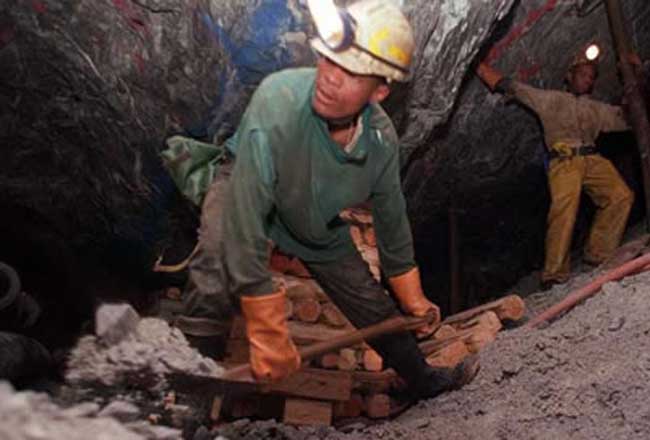
By Adazahira Chávez, desinformémonos.org
Mining yields great dividends to the mine operators, but at great cost to Mexico in lives and the environment. In just two weeks 13 coal miners have died in the northern state of Coahuila.
Since 2010 mining has surged ahead in Mexico, making it the leader in mining investments in Latin America, and making Mexico third highest country in return on investment. Investment in mining during the Calderón government has already reached US$15.14 billion; 2011 saw the highest level of investment of the presidential term.
In that year the value of mining production reached almost US$14 billion, exceeding the tourism sector. The volume of production in the first half of 2011 rose 16.6 percent over the previous year, while the value of production increased 50 percent. The value of coal production alone rose 43 percent.
Exploitation of the land
As Francisco López Bárcenas pointed out in an earlier interview with Desinformémonos, because mineral resources are part of the national patrimony, “they are not converted into private property.” They are exploited, instead, through the mechanism of concessions. From 2000 to 2010 the surface area granted in concessions to mining companies reached approximately 25 percent of Mexico’s territory. Fifteen percent of the national territory was conceded to mining companies between 2006 and 2010, and by June 2011 another million hectares were granted.
López Bárcenas emphasizes that in the process the Mexican people are being deprived of their patrimony: “They take the material being mined and leave nothing good behind. They leave a ruined and contaminated environment and an unhealthy population.”
The Center for Social Studies and Public Opinion (CESOP), in working paper 121, notes that the Canadian mining company Gold Corp found two major advantages in Mexico for the mining industry: strong government support and a favorable tax structure.
In most countries corporations that exploit subsoil resources must pay taxes for doing do. Mexico’s low tax rates are an incentive for the companies. Taxes on mining rights range from 5 to 111 pesos per hectare. Also, no taxes are levied on the product produced, while in other countries such taxes reach as much as 18.5 percent.
Labor conditions on the ground
The high profits in the mining sector are not reflected in improved working conditions. A comparative study by the International Federation of Workers in Metallurgical Industries (FITIM) reported in 2008 that Mexican workers receive the lowest wages; in Canada and the United States wages are 16 times higher than in Mexico. The same study found that Mexican workers work longer hours.
CESOP reports similar differences with regard to worker’s compensation for accidents. While in the United States the heirs of the 29 miners who died in the Upper Big Branch disaster received US$46.5 million, the families of the 69 miners who died in the Pasta de Conchos disaster in Mexico received just US$84,000. According to the Pasta de Conchos Family organization the figure might be even lower.
Homicides, not accidents
On Friday, August 3, 2012 a cave-in killed 6 miners in Mine VII of the MIMOSA mining complex, property of Altos Hornos de México, in Progreso, Coahuila State. Just 9 days earlier, 7 miners had died in the same state while extracting the same mineral—coal.
MIMOSA, which is owned by Alonso Anciera Elizondo, one of the 10 richest men in Mexico, was quick to provide an explanation that the cause of the disaster was a cave-in, and denied that there was an explosion.
The National Union of Workers in Mining, Metals, Steel, and Similar Substances of Mexico considered that explanation unlikely. For the union the company was to blame, due to “criminal lack of foresight, insensitivity, and irresponsibility,” because it had not provided an adequate level of safety for the workers.
They also complained that neither the government nor the companies allow the workers in the mines to unionize as a way of acquiring the necessary protection.
In view of such “criminal negligence” by the mining companies, for whom the workers are “nothing more than accounting ciphers” in the search for profits, the union resolved to present a formal complaint accusing both the companies and the responsible employees of “homicide by omission.”
In addition, 500 unionized workers peacefully occupied the entrance of the stricken mine to denounce the lack of safety and the collusion of corrupt union leaders who were complicit in the conditions the miners suffer under, including a daily wage of 98 pesos “which is an exploitative starvation wage, for which the workers risk their lives daily,” in addition to the “absolute lack of adequate safety and industrial orderliness.” They complained that the present union leaders gained their position by irregular methods and “pocket union funds for themselves.”
The union reported that from 2006 to August 2012 more than 200 miners have died in accidents in the northern state of Coahuila alone.
Journalist Sanjuana Martínez reports that the companies involved “are always the same ones”: Minera Díaz, MINSA/AHMSA, PEMSA/AHMSA, AlvaRam, El Sabino SA de C., Minería y Acarreos de Carbón SA de CV y Beneficios Internacionales del Norte, SA de CV (BINSA), Compañía Minera El Progreso, SA de CV, Industrial Minera México (IMMSA) del Grupo México.
Nevertheless, up to now penalties have been mine closers, usually temporary, or fines that are practically meaningless compared to company profits. For Bishop Raúl Vera, “it is very easy to identify where responsibility lies: the main criminals or those criminally responsible are the people who allow these mines to operate in a totally irresponsible way.”
Adazahira Chávez is director of desinformémonos.org. The original article can be found here: http://desinformemonos.org/2012/08/siete-dolares-el-salario-por-el-que-dieron-la-vida-los-mineros-en-coahuila/
Translation by Tom Holloway
Edited by Yasmin Khan



